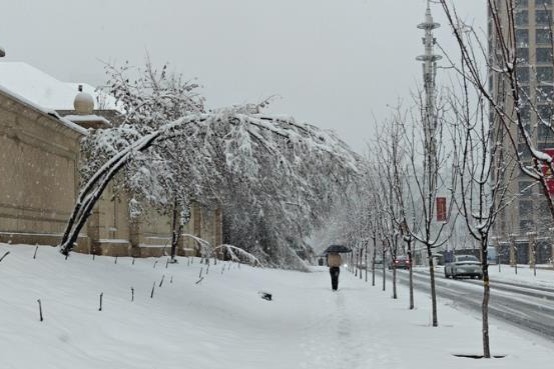Insights on HK from Deng Xiaoping's speeches


Protests in the Hong Kong Special Administrative Region (SAR) have not stopped, although Chief Executive Carrie Lam Cheng Yuet-ngor has repeatedly said the extradition amendment bill, which sparked the protests, is "dead" on different occasions. The continuing protests on Hong Kong's streets are part of a conspiracy between opposition figures, some radicals and external forces.
During the past months, these people have been inciting confrontation between the Hong Kong government and citizens, turning initially peaceful protests into illegal violence and even challenging the bottom line of "one country, two systems". Their violent acts exhibit earmarks of a "color revolution". And as the violence is getting more and more intense, "signs of terrorism" are emerging.
In such a context, it is of special significance that we review speeches by former Chinese leader Deng Xiaoping, made on Oct 3, 1984, when he met with a delegation of Hong Kong and Macao compatriots attending the National Day celebrations, and on April 16, 1987, at a meeting with the members of the drafting committee of the Basic Law of the Hong Kong SAR (Basic Law).
Hong Kong's achievements today are attributed to "one country, two systems"
"One country, two systems" is a preferential State policy adopted by the central government toward Hong Kong and Macao. The original purpose of "one country, two systems" is to make Hong Kong and Macao return to China's sovereignty and achieve cross-Straits reunification by allowing a socialist system and capitalist system to coexist in a socialist country. This is a great pioneering initiative, an unprecedented innovation without a doubt. It is just as Deng Xiaoping said when he met with members of the drafting committee of the Basic Law: "This is something new. It was created not by the United States, Japan, the Soviet Union or any European country, but by China; that is why we call it a Chinese characteristic." He added, "We are building socialism suited to Chinese conditions, which is why we were able to formulate the policy of 'one country, two systems' and why we can allow the two different systems to coexist. We would not be able to do this if we lacked courage, the courage that comes from the support of the people. Our people support the socialist system and leadership by the Party."
Hong Kong enjoys a high degree of autonomy, which even exceeds that of states under some federal governments, if we consider it comparatively. The SAR enjoys an extremely wide range of administrative powers, covering economics, education, science, culture, sports, religion, social services, social security, and exit and entry management. In addition, Hong Kong also enjoys some rights on foreign affairs under central government authorization. But its most important right of autonomy, above all, is in finance and economics. For example, the HKSAR has its own independent tariff system and it does not need to turn over its tax revenue to the central government. Apart from that, Hong Kong also has its own independent monetary system and the Hong Kong dollar can be exchanged to other currencies freely. Although the land of Hong Kong is State-owned, it is managed by the SAR government and the revenues derived from it are exclusively at the disposal of the SAR government.
Besides, Hong Kong also enjoys an extremely broad range of legislative powers and can enact laws applicable in the SAR in civil, criminal, commercial and legal proceedings and other aspects in accordance with the Basic Law. The laws previously in force in Hong Kong (that is, the common law, rules of equity, ordinances, subordinate legislation and customary law) have been maintained, save for any that contravene the Basic Law, and are subject to subsequent amendment by the HKSAR legislature. After the establishment of the HKSAR, the Court of Final Appeal has also been set up to exercise the power of final adjudication in the region. The judicial system previously practiced in Hong Kong has been maintained except for those changes consequent upon the establishment of the Court of Final Appeal. The common law and relevant judicial principles and systems previously practiced in Hong Kong, including the principle of independent adjudication, the principle of stare decisis and the jury system, have continued to apply. When adjudicating cases, the courts of the HKSAR may refer to precedents of other common law jurisdictions, and the Court of Final Appeal may as required invite judges from other common law jurisdictions to sit in the Court of Final Appeal.
The wide-ranging and high degree of autonomy has created favorable conditions for Hong Kong's economic development and has promoted and consolidated its status as an international hub of financing, trade and shipping. All these are dividends brought about by "one country, two systems". In addition, the Chinese mainland has been giving priority to meeting the needs of Hong Kong residents in supplies of food, tap water and all kinds of daily necessities. Infrastructure, such as high-speed railway and the Hong Kong-Zhuhai-Macao Bridge, is constructed to help integrate Hong Kong into the national transportation network and make it more convenient for Hong Kong people to travel to the mainland. Apart from that, Hong Kong residents can travel to and from the mainland simply with a Mainland Travel Permit for Hong Kong and Macao Residents, and can stay in the mainland with no time limit. China is also constantly introducing new policies and measures to facilitate Hong Kong people's work, studies and lives on the Chinese mainland. Without the strong support from the motherland, Hong Kong would not be self-sufficient in food, clothing, housing and transportation, let alone become an international financial, trade and shipping center or an international metropolis full of vitality and freedom.
After Hong Kong's return to China in 1997, many people in Hong Kong hadn't realized the change of their identity and Hong Kong's constitutional order. Hong Kong people have values and lifestyles similar to the West, so some of them don't have enough understanding of or affective commitment to China. Foreign forces have taken the opportunity to infiltrate. For example, the US has been trying to turn Hong Kong into a pawn to hinder China's development, while the UK, an ally of the US and the former ruler of Hong Kong, often pokes its nose into the administration of the SAR government. In addition, the deep-seated contradictions in Hong Kong society have not been resolved after its return, which leads to mounting public grievances. It was under such conditions that the opposition groups took use of the controversies sparked by the extradition amendment bill to make waves and throw Hong Kong society into turbulence.
- English teacher empowers students to tell Xinjiang's stories better
- Xi congratulates Paul Biya on re-election as president of Cameroon
- Xinjiang launches consumption voucher program to boost winter tourism
- 161 nominations received for Hong Kong LegCo election
- China's State Council appoints, removes officials
- Changping builds core of science power


































